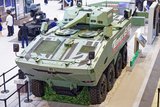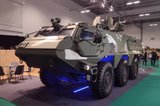French Army still not committed to Hornet Air Guardian anti-drone concept
A mock-up of Hornet Air Guardian mounted on an HMMWV platform was displayed at the 2022 AUSA event in Washington DC. (Photo: Christopher F Foss)
Almost one year after being unveiled, the Hornet Air Guardian – a counter-drone variant of the Hornet remote control weapon station (RCWS)– remains at concept stage with no launch customer secured as officials still attempt to demonstrate its value to the French Army.
Launched in June 2022 at Eurosatory, the Hornet Air Guardian, manufactured by Arquus sister company Hornet, had attracted a lot of attention.
The counter-drone kit is based on the Hornet RCWS, already in service with the French Army. Its key distinguishing feature is the ability to neutralise UAVs simultaneously with the conventional operation of the turret.
'Hornet Air Guardian
Already have an account? Log in
Want to keep reading this article?
More from Land Warfare
-
![CAVS rides a wave and prepares for surge requirements as orders roll in]()
CAVS rides a wave and prepares for surge requirements as orders roll in
The Common Armoured Vehicle System is continuing to rack up orders as the British Army looks likely to become an operator of the vehicle, while Italy and Ireland are also contenders.
-
![US DoD task force’s DroneHunter acquisition lays groundwork for Replicator 2 CUAS strategy]()
US DoD task force’s DroneHunter acquisition lays groundwork for Replicator 2 CUAS strategy
As the US Department of Defense looks to counter the growing threat of uncrewed aerial systems to improve homeland security, the DroneHunter acquisition could point to future commercial innovation.
-
![Norway opts for Hanwha’s Chunmoo for long-range fires under $2 billion deal]()
Norway opts for Hanwha’s Chunmoo for long-range fires under $2 billion deal
The selection of Hanwha’s K239 Chunmoo long-range precision fires system, with a contract expected to be signed on 30 January, makes Norway the second European country to choose the system. It is expected an operational system will be in service within four years.
-
![Land forces review: Tanks, trucks and IFVs dominate but woes remain for Ajax]()
Land forces review: Tanks, trucks and IFVs dominate but woes remain for Ajax
This year has begun with main battle tanks taking the lead while orders for large logistics and support vehicles continued from last year. Additionally, two of the British Army’s most significant contracted vehicle programmes, Ajax reconnaissance vehicle and Challenger 3 tank, continued to make news in January.
























